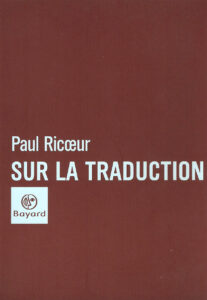On Translation by Paul Ricœur: Rethinking Linguistic Hospitality
In his first essay, Ricœur revisits the old Italian saying traduttore, traditore — “to translate is to betray.” Far from treating this as a curse, he sees it as the very heart of translation.
- Perfect fidelity is impossible. No two languages share the same grammar, connotations, or history. Literal, word-for-word translation quickly collapses into nonsense.
- But betrayal is never complete. The text survives, transformed but still alive, thanks to what Ricœur calls a “dynamic fidelity” — a striving for equivalence.
Here, he draws on Walter Benjamin (The Task of the Translator) and Wilhelm von Humboldt, who viewed each language as its own vision of the world. Translation, then, is a hermeneutic act: it interprets, understands, and recreates, while focusing on the quality of translation. A process that cannot be reduced to simple document translation services.
The translator’s dilemma: between fidelity and betrayal
In his first essay, Paul Ricœur revisits the old Italian saying traduttore, traditore — “to translate is to betray.” Far from treating this as a curse, he sees it as the very heart of translation.
- Perfect fidelity is impossible. No two languages share the same grammar, connotations, or history. Literal, word-for-word translation quickly collapses into nonsense.
- But betrayal is never complete. The text survives, transformed but still alive, thanks to what Ricœur calls a “dynamic fidelity” — a striving for equivalence.
Here, he draws on Walter Benjamin (The Task of the Translator) and Wilhelm von Humboldt, who viewed each language as its own vision of the world. Translation, then, is a hermeneutic act: it interprets, understands, and recreates. A process that cannot be reduced to simple document translation services.
The Paradigm of Translation: A Model for Understanding Otherness
In the second essay, Ricœur widens the lens. Translation, he argues, is not just about words, it’s a model for how we think about relationships between people, cultures, even disciplines.
Every act of communication across difference plays the same game: reaching for equivalence without ever erasing difference. To understand another person is not to absorb them, but to move toward them. Translation thus becomes a metaphor for dialogue, a constant negotiation, an acknowledgment of difference, an effort to bridge the gap.
Here, Gadamer’s dialogical hermeneutics (Truth and Method) is clearly at play: to understand is always to “understand with.”
Translating the Untranslatable: Limits, Creativity and Quality of translation
The third essay confronts the stumbling block every translator knows: the untranslatable. Idioms, cultural references, poetic images, some things resist transfer. Should we give up?
Ricœur answers firmly: no. The untranslatable is precisely what sparks creativity. It pushes the translator to invent, to find equivalents that resonate, to preserve the spirit if not the letter. What seems like a limit becomes the very engine of invention.
An ethic of linguistic hospitality
Perhaps the most memorable idea in the book is Ricœur’s metaphor of linguistic hospitality. To translate, he says, is to welcome another language into your own, to give it shelter without stripping it of its foreignness.
This hospitality is ethical:
- Welcoming without erasing: the foreignness of the other language must still be felt.
- Sharing without owning: translation makes a text accessible, but it never belongs to the translator.
- Accepting loss: every translation involves letting something go.
Here, Ricœur frames translation as a philosophy of coexistence: understanding without domination, dialogue without erasure.
Translation, Interpretation, and the Philosophy of History
Finally, Ricœur connects translation to his wider work on hermeneutics. To translate is to interpret. Meaning is never fixed; it is always shaped by languages, cultures, and contexts.
Translation is therefore an experience of time and history:
- It passes texts from past to present by reformulating them.
- It builds bridges across civilizations.
- It sustains memory and makes knowledge circulate.
Why read the book On Translation today?
Though brief, Ricœur’s essay still speaks powerfully in today’s world of globalization, migration, and cultural contact : a context where online translation companies and translation services have become essential.
Professional translators, who find in it a deep justification of their work.
Students of languages and translation, who gain a foundation for theory and reflection.
Readers of philosophy, curious to see how a seemingly technical act opens onto ethical and political questions.
Conclusion
Ricœur offers no how-to guide, but a lesson in humility and generosity. Translation means accepting imperfection yet trusting that meaning still circulates. It is the practice of a fragile but fertile hospitality.
On Translation is not just for translators. It is for anyone who wishes to reflect on the encounter between languages, cultures, and people.
On Translation
Author: Paul Ricœur
Publication date: January 8, 2004
Pages: 120
Language: French
Price: Paperback $19.99 – Digital $12.99
[Buy the book on Amazon]







